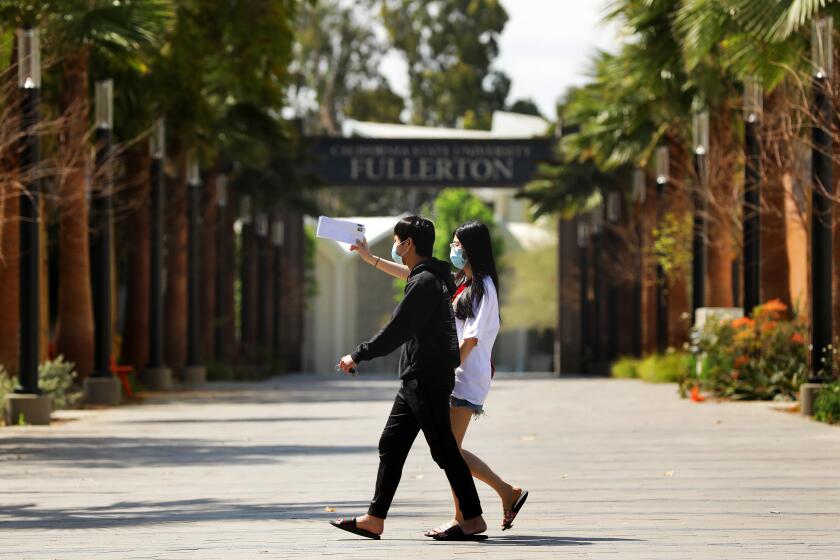Column: How forced and sudden online schooling might inform education going forward
Education’s sudden, massive shift to online learning raises many questions.
How much will students lose? Will any learning deficit become permanent? Will we fall even further behind in math?
The answers are largely unknowable as yet. But several weeks into this unprecedented change because of the coronavirus pandemic, it is possible to glean some understanding of the ways that students, teachers and parents are reacting, and how their experiences might inform education going forward.
Following are a few observations gathered from interviews and news reports:
Adaptability and flexibility are crucial
After extended campus closures, teachers and students were thrust into a situation that is trying on the best of days. They had to become quickly fluent with online learning platforms, adjust to a different style of teaching, and fix technical and organizational glitches.
Precious learning time was undoubtedly lost during this transition. Some deficits will continue because teachers — accustomed to having eyes on an entire classroom — are forced into an extreme form of multitasking.
Just getting classes started is challenging, as everyone grapples with connectivity, sound, and video issues — and with the protocols of operating in an online environment. For a variety of reasons, some students skip class entirely, while others join in late; sadly, they might never catch up.
One student said that an instructor spent the first few online classes dealing with technical snags and griping about the situation. While the student shared in the frustration, after a while his attitude was, “Yeah, OK, but teach us some stuff.”
The bottom line is that this is tough, and patience is required.
Focus, focus, focus
Many students, from the youngest to college level, find it hard to stay engaged and on task while working at home. Class time is often compromised, and turn-in rates on assignments are low.
Of course, distractions are everywhere, particularly if space is tight and there are multiple people sharing a household. But for some, the inability to fully engage in online classes has more to do with psychological factors and learning styles.
During one online college class that I observed, several students appeared to be intensely focused, while others evidently struggled. One student was in bed — hardly ideal but not as bad as another that was smoking.
An elementary school teacher told me about one student who vanished from the screen during class. When she asked him where he’d been, he replied that he had to eat.
Vulnerabilities are exposed
The shift to nearly universal online education is laying bare the stark inequalities that have long existed in education.
Nationwide, nearly 12 million children live in homes without a broadband connection. In California, it’s estimated that more than 400,000 more computers and hot spots are needed. 200,000 additional student households lack them.
Some of those households are in Orange County, and districts here have been scrambling to get students connected.
One local teacher related to me the difficulties encountered trying to connect with her low-income students, such as one who lost her only means of accessing the internet — her mother’s cell phone hotspot — when the mother left for work.
There is no substitute for face-to-face interaction
A great deal is being learned about online education, and many capabilities and techniques that are being refined will be useful after campuses reopen.
But one point has been made abundantly clear: Even if we rely more heavily on online learning in the future, students by and large will still need to attend a physical school.
In part, that’s because of the value of the interactive classroom dynamic. But the social element might be even more critical.
Schools are crucial to the development of children, not solely because of what they learn in a classroom, but also due to the shared experiences, activities, and sense of belonging that they create. Remaining distanced from that community can be emotionally draining, as it was for one student who became distraught because she wasn’t able to see her friends and teacher.
“No one can underestimate the power of that community and the classroom,” the girl’s teacher said.
Some changes could endure
On April 20, Cal State Fullerton became one of the first universities in the nation to announce plans to continue with online classes at the start of fall semester. Others will follow, while some schools might develop hybrids of less-than-usual classroom time and more virtual learning.
Cal State Fullerton says that amid coronavirus uncertainty it will prepare to start the fall semester with online instruction. Will other campuses follow suit?
Either way, online education will continue to be in the forefront for the foreseeable future.
Other developments might signal long-term changes. Consider the University of California’s decision to eliminate SAT scores and letter grades for required courses for current applicants, and the Cal State University system’s similar easing of admissions requirements.
While these measures were characterized as temporary, they might lead to a reevaluation of admissions standards going forward.
Meanwhile, some universities have begun notifying staff of layoffs as they anticipate revenue and enrollment declines due in large measure to hard-hit family finances. These cutbacks could have serious ramifications for years to come.
Teachers are superstars
We shouldn’t be laying anyone off. Instead, we should direct some recovery funds to giving educators the big fat raises they deserve.
Indeed, if we don’t show adequate appreciation for the Herculean lifting teachers are doing under these intensely difficult circumstances, we just might find ourselves with a gaping deficit another kind — an acute shortage of people crazy enough to go into this undervalued profession.
All the latest on Orange County from Orange County.
Get our free TimesOC newsletter.
You may occasionally receive promotional content from the Daily Pilot.





